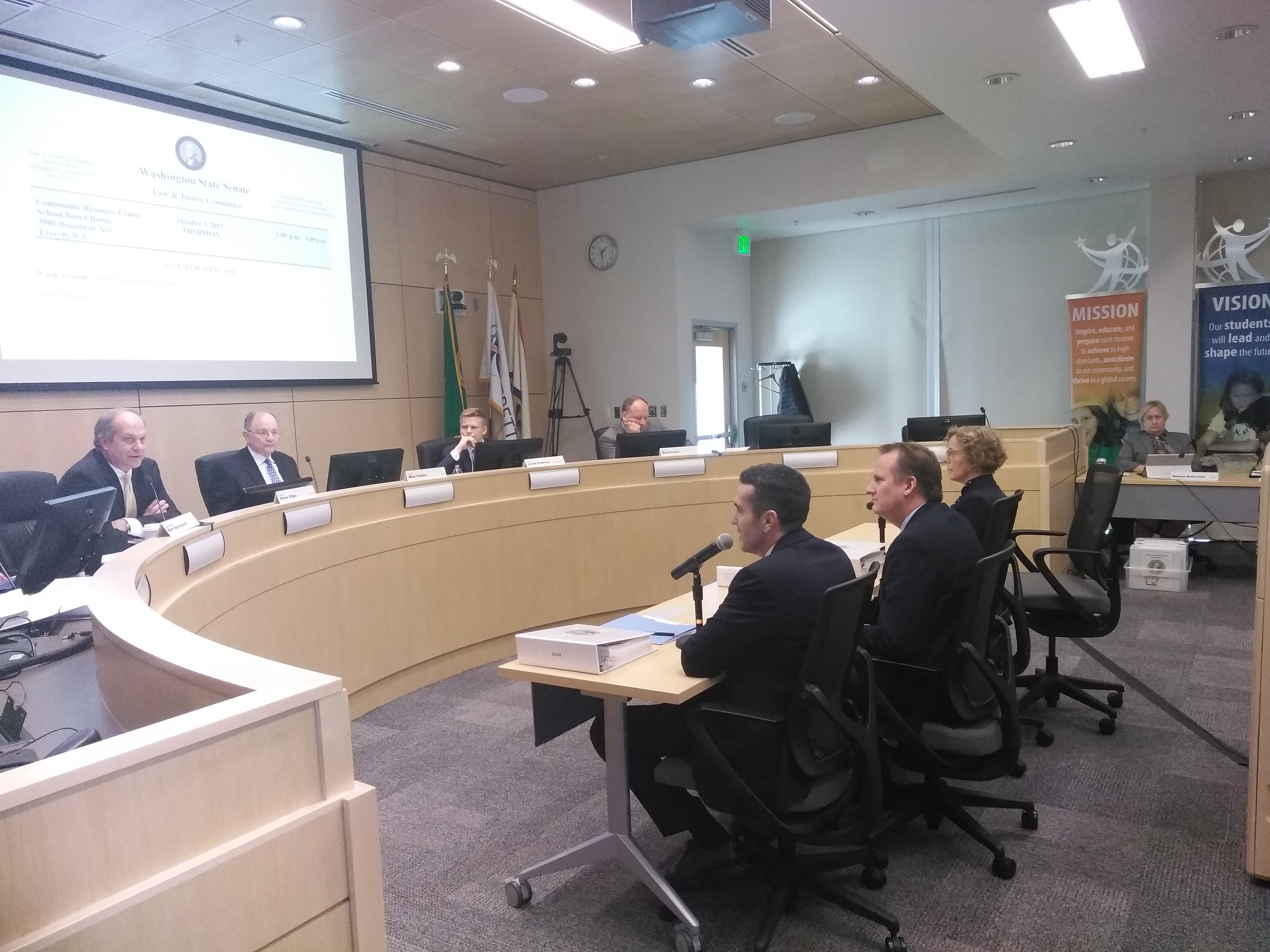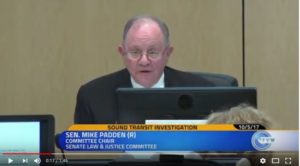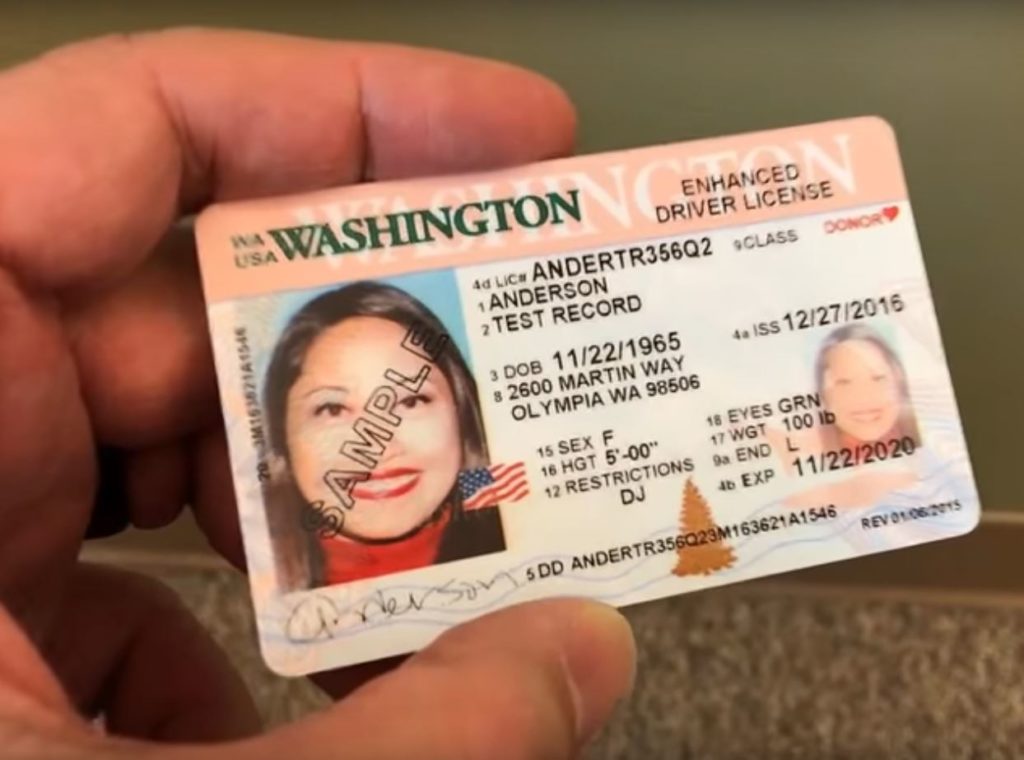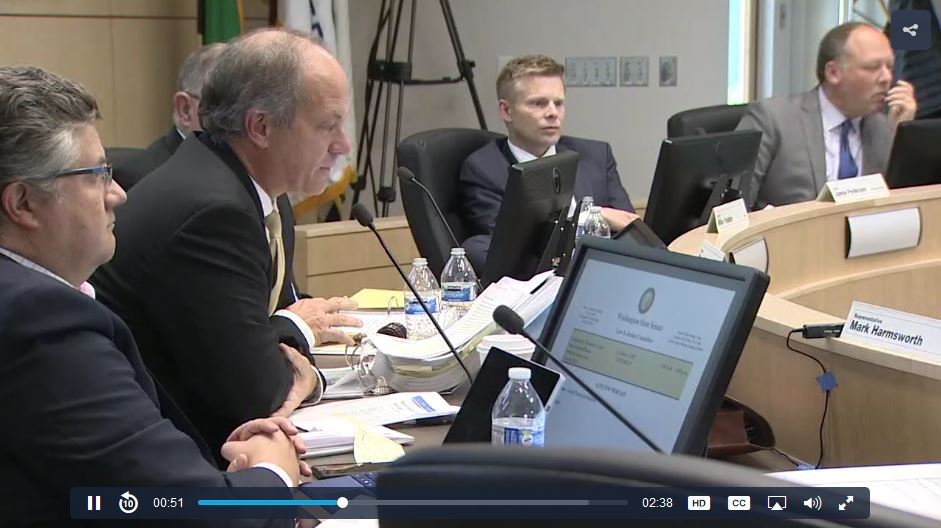The following newsletter was sent to subscribers to Sen. Padden’s Report From Olympia, Oct. 17, 2017. To subscribe to Sen. Padden’s newsletters, click here.
 At a Senate Law and Justice Committee investigative hearing in Everett, Sound Transit officials face tough questions about the use of public resources in last year’s $54 billion bond issue campaign.
At a Senate Law and Justice Committee investigative hearing in Everett, Sound Transit officials face tough questions about the use of public resources in last year’s $54 billion bond issue campaign.
Dear friends and neighbors,
Most of us dread waiting in line at the Department of Licensing to renew our drivers’ licenses. That wait is likely to get longer in the months ahead. Sometime soon, the licenses most of us use will no longer be sufficient for airplane boardings. Washington residents will have to upgrade licenses and ID cards to comply with new federal standards. Exactly when these rules will kick in, nobody knows, but they’re coming.
The new federal rules are complicated enough as it is. To obtain new licenses that will allow us to travel by air, all of us will have to bring paperwork to the driver’s licensing office to prove our citizenship. But the new procedures will be further complicated by the way the Washington Legislature chose to comply with federal law. There will be two types of licenses in this state, one good for air travel, one of them not. I will explain this new arrangement in this week’s newsletter, but I certainly don’t want to defend it.
In other news, the Senate Law and Justice Committee held its second hearing in our investigation of Sound Transit, the Seattle-area light-rail agency that promised the Legislature one thing and sought voter approval for another. Voters never understood their license tab fees would skyrocket. The affair has ruptured public trust and has given government at all levels a black eye, and it is a concern for the entire state. We are preparing findings for the Legislature that will guide us toward solutions in the coming session.
Sen. Mike Padden
Federal law forces big changes to drivers’ licenses
Big changes are coming to drivers’ licenses in this state. Those of us who travel by plane – meaning most of us — eventually are going to need “enhanced” drivers’ licenses for airport check-ins. These new enhanced licenses will require us to prove our citizenship when renewing our licenses or obtaining new ones, and additional paperwork will be needed at the licensing counter.
This state already offers an enhanced license. So there is likely to be a rush of people at the licensing office as people renew early and upgrade to this new type of license. If you go early, you may beat the line.
Unfortunately, the process will be complicated. I would have preferred that the state offered a single type of license for everyone. Instead the Legislature adopted a system that continues to force us to choose between two types of licenses — enhanced licenses and the standard licenses most of us currently use. An explanation is in order.
Q. Why the new rules?
A. In the wake of the 9/11 terrorist attack, Congress passed the REAL ID Act of 2005 to tighten up identification requirements nationwide. The law requires citizenship checks and security features for state-issued ID cards and licenses that are used for air travel, border crossings and other “federal” purposes. This state has received several extensions from the feds, but it is clear that time is running out. This forced the state to come up with a new system that complies with federal rules. Unfortunately, the Legislature did it in the most confusing way possible — a “two-tiered” system that forces people to choose which type of license they will use.
Q. What does this mean for me?
A. Most of us will want an enhanced license. You will need one if you visit Canada or travel by air and wish to avoid other cumbersome ID requirements. If you continue to use a standard license, you will need to need to bring a passport or some other form of federally-approved identification to border stations and airports. These enhanced driver’s licenses and ID cards contain a chip with additional identification information.
Q. When will it become necessary to present federally-compliant ID to board air flights?
A. No one knows, and additional confusion is likely on this point. Media coverage frequently focuses on Washington’s temporary exemption from federal rules. This exemption is now set to end in January. Washington has asked for another extension to October. But these deadlines refer to state compliance with federal ID requirements. What matters to most people is the date when enhanced licenses will be needed for air travel, and the feds still have not told Washington state when that will be.
Q. How do I get an enhanced driver’s license?
A. When you obtain a new license, or upgrade an existing license at the time of renewal, you will need to provide proof of citizenship. This can include a passport, an original certified birth certificate issued in the United States, or an enhanced license from another state. You also will need proof of identity and Washington-state residency. A description of the ID requirements appears here.
Q. How much does it cost?
A. An enhanced driver’s license or ID card costs $78 and is good for six years. For more information, click here.
Q. What if I’m not a citizen?
A. Unlike other states, Washington will provide enhanced licenses only to citizens. Non-citizens will only be able to obtain “standard” licenses that are not sufficient for air travel, border crossings, access to military bases or other federal ID purposes. If you have a standard license, you’ll need to bring other federal ID with you. For legal residents, a green card will work.
Q. Why was this so hard for Washington?
A. Federal law says enhanced licenses can only be issued to citizens and those who are here legally. But Washington is the only state in the country that issues drivers’ licenses to people who are in this country illegally. Many of us oppose this practice and would prefer a system that is consistent with federal immigration rules, but our view is in the minority in the Legislature. Because enhanced licenses cannot be issued to those who are in this country in violation of immigration rules, Washington will continue to offer two types of licenses. After July 1, this state’s “standard” licenses will bear a prominent legend indicating that they cannot be used for federal ID purposes. Because virtually everyone who qualifies for an enhanced license will probably want to obtain one, nearly everyone who continues to use a standard license will be a non-citizen. However, because Washington lumps together illegals with people who have green cards, it will be impossible to determine who is breaking the law simply by looking at a driver’s license.
Failure to pass Hirst fix begins to hit home
Oct. 6 marked the first anniversary of the Hirst decision, the Washington Supreme Court decision that makes it difficult, if not impossible, for people in rural and suburban areas to develop new household sized wells on their property. Because urban lawmakers — most of them in the opposing party — have resisted a fix to this important issue, the Senate has delayed passage of a public-works construction budget.
While some important projects have temporarily been put on hold, others are proceeding with funds already approved by the Legislature, or by utilizing other creative solutions. For example, the North Pines Elementary School project in the Central Valley School District is proceeding because Spokane County has loaned the district $8.5 million.
It is important to recognize the scale of the Hirst disaster. So far 10 state employees have been laid off because of this temporary delay in the capital budget. But according to an independent study commissioned by the Building Industry Association of Washington, 9,300 people will lose jobs every year if the Hirst decision is allowed to stand. Property values will be reduced an astounding $37 billion, and the loss to our state economy will be $7 billion a year. This demonstrates why the Senate is right to insist on its position.
Sound Transit grilled over questionable campaign practices

At our Oct. 5 hearing, Sound Transit officials answer charges that they misled the Legislature. To see clip, click here.
On Oct. 5, the Senate Law and Justice Committee held a second hearing in its investigation of Sound Transit, the light-rail agency that sought authority from the Legislature for $15 billion in new taxing authority, then asked voters to approve $54 billion. Motorists in King, Pierce and Snohomish counties have been outraged by dramatic increases in license tab renewal fees. The agency failed to publicize the fact that it planned to use a vehicle valuation schedule that overvalues cars and trucks for tax purposes. This fact was concealed by dense and impenetrable language in the bill Sound Transit presented to the Legislature, and the tactic is an apparent violation of the state constitution.
At last week’s hearing, we probed the use of public resources to promote the bond issue – a violation of state law. In response to a public records request, Sound Transit provided 173,000 email addresses to Mass Transit Now!, the campaign for the bond issue, and these were used for campaign mailings. The addresses of Sound Transit’s 172,000 transit passholders should not have been disclosed. Testimony from Sound Transit officials established that they knew the request came from the campaign – yet it apparently raised no alarm bells. Worse yet, no one at Sound Transit was disciplined for the breach. Communications director Craig Davison said, “We wouldn’t be able to retain talent or attract it if we were to take punitive actions every time a mistake was made.”
At the same time, Sound Transit has been funneling large amounts of money to the organizations that promoted the bond issue and lobbied the Legislature, in the form of “membership fees.” One organization, the Transportation Choices Coalition, gets $35,000 a year in public money from Sound Transit, yet is exempt from the tough reporting requirements imposed on most lobbying and campaign organizations. Sound Transit officials maintain everything was on the up-and-up.
The case has greatly diminished public trust in the agency, and has tarnished the reputation of government at all levels. One measure: The bond issue passed with 54 percent of the vote, but more recent polling indicates only 37 percent would say yes if voters had a chance for a do-over.
In the news: More scrutiny for Sound Transit
Seattle TV station KING-5 offered this report on our Sound Transit investigation after our hearing last week. To see story, click here or video above.
Other notable stories include this piece from the Seattle Times: State senators grill Sound Transit over actions during last fall’s $54B ballot measure.
Contact us
If you have a question or concern about state government, please do not hesitate to contact our office. We are here to serve you!
Phone: (509) 921-2460
Street address: 11707 East Sprague Ave., Suite 305, Spokane Valley, WA 99206
Email address: Mike.Padden@leg.wa.gov













